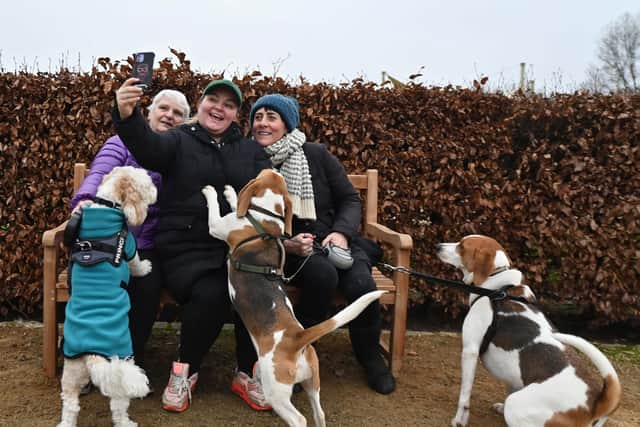From the grassroots to government, we can all help fix loneliness - Kenneth Watt
As we made it back to coffee shops, pubs, and football matches, a feeling of normality came flooding back.
Even going back to work – including the sweaty commute and breathless walk to the bus stop – was a joy for some of us.
Advertisement
Hide AdAdvertisement
Hide AdBut as life returns to normal for most – and mindful that the recent increase in Covid cases will be troubling to some – we need to be as conscious as ever of the impact loneliness can have on too many people’s lives.
The shape and size of our collective isolation may have changed, but we should remember that, for some, this was a serious issue prior to the pandemic and it could become even more severe.
The dust may have settled on lockdown restrictions and their immediate impacts, but there are numerous long-term effects hanging over us.
The regular briefings and publication of statistics have ceased, yet cases of Covid are still high and increasing.


Society at-large might be learning to live with it but a great number of people – not least the elderly, the vulnerable, and those who care for them – remain fearful of infection.
Leaving the house to go to a crowded location is not a risk worth taking, so many don’t. Others have simply got out the habit of being out and about, it’s been so long.
Socialising, meeting new people, and even renewing old acquaintances can be a cause of significant anxiety. Meanwhile, the rising cost of living has brought new challenges, forcing many people to restrict their socialising.


We can’t pretend that tackling loneliness is no longer a priority.
Advertisement
Hide AdAdvertisement
Hide AdA new online YouGov opinion poll for the British Red Cross found that 30 per cent of people feel lonelier than this time last year, despite Covid restrictions easing.
The overwhelming majority of Scots (84%) agree that loneliness is still a problem now even though restrictions have lifted, and 59 per cent said they sometimes, often or always feel lonely.
Most people (89%) agreed that the increased cost of living will make more people lonely, and 53 per cent said they are restricting how much they socialise because the cost of living is going up.
To address these issues requires action – from government to the grassroots.
For a start, in Scotland, we need to build on the important work that was done to tackle loneliness during the pandemic.
This needs to cut across government, ensuring there is no area of policy that neglects loneliness as a relevant consideration.
Transport strategies should consider how to link up communities, especially those with high levels of deprivation, and ensure good connections to town and city centres where crucial facilities are available.
So too must digital policy.
Even those we don’t immediately think of as being ‘switched on’ from a technological point of view can benefit from at least a good phone and internet signal to help arrange activities, keep in touch with loved ones, and discover new interests.
Advertisement
Hide AdAdvertisement
Hide AdHousing policy also has a part to play and we need to ensure new developments are planned and built with community spirit in mind, limiting
the potential for vulnerable people to be cut off and forgotten about.
Scotland’s 32 local authorities should set out their own action plans, while efforts to gather vital data on loneliness need redoubling if we’re to properly understand what help people need.
But the responsibility to tackle loneliness goes beyond government – we all have a role in this. It could be afflicting some of our friends and colleagues and we might not ever realise.
A loss of confidence, expressions of frustration, tiredness, and seeming to act without purpose can all be signs that someone is experiencing loneliness – even if they haven’t fully acknowledged it themselves yet.
This can be brought on by a range of things, not least life-changing events like bereavement or retirement.
Even seemingly happier occasions, like becoming a new parent or finally leaving hospital after a long stay, can be contributors.
Thankfully, there is support out there – and it demonstrates the value of new approaches to health that prioritise the social as much as the physical.
Advertisement
Hide AdAdvertisement
Hide AdFunded by the Scottish Government, the British Red Cross runs the Connecting With You service, with experienced volunteers helping people to reconnect with their local community by providing telephone, online, and in-person support to help rebuild confidence, make people feel better connected, and more involved in their community.
One to benefit is Sandhya Kumar – a 58-year-old from Glasgow – who was told about the Connecting With You service by her GP, and first made contact during the 2020 Covid lockdown. She spends long periods in her house due to ill health and her husband being out at work all day.
“It’s helped me feel less alone and made me realise I’m not the only one struggling with loneliness – there are so many other people I’ve met through this that are in the same boat. I feel so much more positive now because I know somebody is there and I’m not alone,” she said.
As so many of us look forward and imagine our lives lighting up again, one connection at a time, we should remember that, for Sandhya and many others, the future can look like a dim, unpromising highway – at least until the rest of us flicker into view.
If you are aged 18 and over, living in Scotland and experiencing loneliness or social isolation, contact the Connecting With You service on 0300 30 36 077 between 10am – 4pm, Monday to Friday.
-Kenneth Watt is policy and public affairs manager for devolved nations with the British Red Cross.
Comments
Want to join the conversation? Please or to comment on this article.
